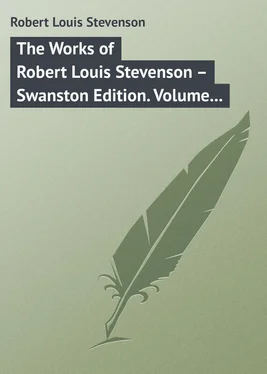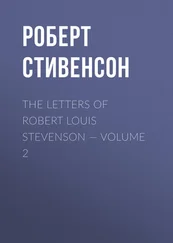Robert Stevenson - The Works of Robert Louis Stevenson – Swanston Edition. Volume 23
Здесь есть возможность читать онлайн «Robert Stevenson - The Works of Robert Louis Stevenson – Swanston Edition. Volume 23» — ознакомительный отрывок электронной книги совершенно бесплатно, а после прочтения отрывка купить полную версию. В некоторых случаях можно слушать аудио, скачать через торрент в формате fb2 и присутствует краткое содержание. ISBN: , Жанр: foreign_prose, на английском языке. Описание произведения, (предисловие) а так же отзывы посетителей доступны на портале библиотеки ЛибКат.
- Название:The Works of Robert Louis Stevenson – Swanston Edition. Volume 23
- Автор:
- Жанр:
- Год:неизвестен
- ISBN:http://www.gutenberg.org/ebooks/30894
- Рейтинг книги:3 / 5. Голосов: 1
-
Избранное:Добавить в избранное
- Отзывы:
-
Ваша оценка:
- 60
- 1
- 2
- 3
- 4
- 5
The Works of Robert Louis Stevenson – Swanston Edition. Volume 23: краткое содержание, описание и аннотация
Предлагаем к чтению аннотацию, описание, краткое содержание или предисловие (зависит от того, что написал сам автор книги «The Works of Robert Louis Stevenson – Swanston Edition. Volume 23»). Если вы не нашли необходимую информацию о книге — напишите в комментариях, мы постараемся отыскать её.
The Works of Robert Louis Stevenson – Swanston Edition. Volume 23 — читать онлайн ознакомительный отрывок
Ниже представлен текст книги, разбитый по страницам. Система сохранения места последней прочитанной страницы, позволяет с удобством читать онлайн бесплатно книгу «The Works of Robert Louis Stevenson – Swanston Edition. Volume 23», без необходимости каждый раз заново искать на чём Вы остановились. Поставьте закладку, и сможете в любой момент перейти на страницу, на которой закончили чтение.
Интервал:
Закладка:
But I have strayed from my purpose, which was only to indicate that in the best of these letters of Stevenson’s you have some echo, far away indeed, but yet the nearest, of his talk – talk which could not possibly be taken down, and of which nothing remains save in the memory of his friends an impression magical and never to be effaced.
Sidney Colvin.THE LETTERS OF ROBERT LOUIS STEVENSON
1868-1882
I
STUDENT DAYS AT EDINBURGH
The following section consists chiefly of extracts from the correspondence and journals addressed by Louis Stevenson, as a lad of eighteen to twenty-two, to his father and mother during summer excursions to the Scottish coast or to the Continent. There exist enough of them to fill a volume; but it is not in letters of this kind to his family that a young man unbosoms himself most freely, and these are perhaps not quite devoid of the qualities of the guide-book and the descriptive exercise. Nevertheless they seem to me to contain enough signs of the future master-writer, enough of character, observation, and skill in expression, to make a certain number worth giving by way of an opening chapter to the present book. Among them are interspersed four or five of a different character addressed to other correspondents, and chiefly to his lifelong friend and intimate, Mr. Charles Baxter.
On both sides of the house Stevenson came of interesting stock. His grandfather was Robert Stevenson, civil engineer, highly distinguished as the builder of the Bell Rock lighthouse. By this Robert Stevenson, his three sons, and two of his grandsons now living, the business of civil engineers in general, and of official engineers to the Commissioners of Northern Lights in particular, has been carried on at Edinburgh with high credit and public utility for almost a century. Thomas Stevenson, the youngest of the three sons of the original Robert, was Robert Louis Stevenson’s father. He was a man not only of mark, zeal, and inventiveness in his profession, but of a strong and singular personality; a staunch friend and sagacious adviser, trenchant in judgment and demonstrative in emotion, outspoken, dogmatic, – despotic, even, in little things, but withal essentially chivalrous and soft-hearted; apt to pass with the swiftest transition from moods of gloom or sternness to those of tender or freakish gaiety, and commanding a gift of humorous and figurative speech second only to that of his more famous son.
Thomas Stevenson was married to Margaret Isabella, youngest daughter of the Rev. Lewis Balfour, for many years minister of the parish of Colinton in Midlothian. This Mr. Balfour (described by his grandson in the essay called The Manse ) was of the stock of the Balfours of Pilrig, and grandson to that James Balfour, professor first of moral philosophy and afterwards of the law of nature and of nations, who was held in particular esteem as a philosophical controversialist by David Hume. His wife, Henrietta Smith, a daughter of the Rev. George Smith of Galston, to whose gift as a preacher Burns refers scoffingly in the Holy Fair , is said to have been a woman of uncommon beauty and charm of manner. Their daughter, Mrs. Thomas Stevenson, suffered in early and middle life from chest and nerve troubles, and her son may have inherited from her some of his constitutional weakness. Capable, cultivated, companionable, affectionate, she was a determined looker at the bright side of things, and hence better skilled, perhaps, to shut her eyes to troubles or differences among those she loved than understandingly to compose or heal them. Conventionally minded one might have thought her, but for the surprising readiness with which in later life she adapted herself to conditions of life and travel the most unconventional possible. The son and only child of these two, Robert Louis (baptized Robert Lewis Balfour 3 3 It was the father who, from dislike of a certain Edinburgh Lewis, changed the sound and spelling of his son’s second name to Louis (spoken always with the “s” sounded), and it was the son himself who about his eighteenth year dropped the use of his third name and initial altogether.
), was born on November 13, 1850, at 8 Howard Place, Edinburgh. His health was infirm from the first, and he was with difficulty kept alive by the combined care of his mother and a most devoted nurse, Alison Cunningham; to whom his lifelong gratitude will be found touchingly expressed in the course of the following letters. In 1858 he was near dying of a gastric fever, and was at all times subject to acute catarrhal and bronchial affections and extreme nervous excitability.
In January 1853 Stevenson’s parents moved to Inverleith Terrace, and in May 1857 to 17 Heriot Row, which continued to be their Edinburgh home until the death of Thomas Stevenson in 1887. Much of the boy’s time was also spent in the manse of Colinton on the Water of Leith, the home of his maternal grandfather. Ill-health prevented him getting much regular or continuous schooling. He attended first (1858-61) a preparatory school kept by a Mr. Henderson in India Street; and next (at intervals for some time after the autumn of 1861) the Edinburgh Academy.
Schooling was interrupted in the end of 1862 and first half of 1863 by excursions with his parents to Germany, the Riviera, and Italy. The love of wandering, which was a rooted passion in Stevenson’s nature, thus began early to find satisfaction. For a few months in the autumn of 1863, when his parents had been ordered for a second time to Mentone for the sake of his mother’s health, he was sent to a boarding-school kept by a Mr. Wyatt at Spring Grove, near London. It is not my intention to treat the reader to the series of childish and boyish letters of these days which parental fondness has preserved. But here is one written from his English school when he was about thirteen, which is both amusing in itself and had a certain influence on his destiny, inasmuch as his appeal led to his being taken out to join his parents on the French Riviera; which from these days of his boyhood he never ceased to love, and for which the longing, amid the gloom of Edinburgh winters, often afterwards gripped him by the heart.
Spring Grove School, 12th November 1863.MA CHERE MAMAN, – Jai recu votre lettre Aujourdhui et comme le jour prochaine est mon jour de naisance je vous écrit ce lettre. Ma grande gatteaux est arrivé il leve 12 livres et demi le prix etait 17 shillings. Sur la soirée de Monseigneur Faux il y etait quelques belles feux d’artifice. Mais les polissons entrent dans notre champ et nos feux d’artifice et handkerchiefs disappeared quickly, but we charged them out of the field. Je suis presque driven mad par une bruit terrible tous les garcons kik up comme grand un bruit qu’il est possible. I hope you will find your house at Mentone nice. I have been obliged to stop from writing by the want of a pen, but now I have one, so I will continue.
My dear papa, you told me to tell you whenever I was miserable. I do not feel well, and I wish to get home. Do take me with you.
R. Stevenson.This young French scholar has yet, it will be discerned, a good way to travel; in later days he acquired a complete reading and speaking, with a less complete writing, mastery of the language, and was as much at home with French ways of thought and life as with English.
For one more specimen of his boyish style, it may be not amiss to give the text of another appeal which dates from two and a half years later, and is also typical of much in his life’s conditions both then and later: —
2 Sulgarde Terrace, Torquay, Thursday [April 1866].RESPECTED PATERNAL RELATIVE, – I write to make a request of the most moderate nature. Every year I have cost you an enormous – nay, elephantine – sum of money for drugs and physician’s fees, and the most expensive time of the twelve months was March.
Читать дальшеИнтервал:
Закладка:
Похожие книги на «The Works of Robert Louis Stevenson – Swanston Edition. Volume 23»
Представляем Вашему вниманию похожие книги на «The Works of Robert Louis Stevenson – Swanston Edition. Volume 23» списком для выбора. Мы отобрали схожую по названию и смыслу литературу в надежде предоставить читателям больше вариантов отыскать новые, интересные, ещё непрочитанные произведения.
Обсуждение, отзывы о книге «The Works of Robert Louis Stevenson – Swanston Edition. Volume 23» и просто собственные мнения читателей. Оставьте ваши комментарии, напишите, что Вы думаете о произведении, его смысле или главных героях. Укажите что конкретно понравилось, а что нет, и почему Вы так считаете.










